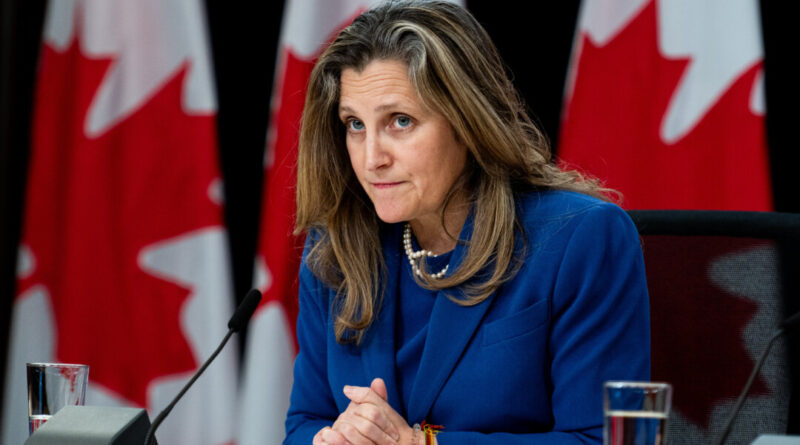Freeland Maintains Silence on Deficit as Mini-Budget Approaches with Fiscal Concerns Ahead
Finance Minister Chrystia Freeland has yet to disclose whether her upcoming mini-budget will adhere to the guideline she set last year to prevent a deficit increase.
Freeland was asked about the projected deficit multiple times during a press conference on Dec. 10 but did not provide any information.
“I am not going to comment on anonymous rumours that are out there in the town right now,” she said.
The finance minister will present her Fall Economic Statement in the House of Commons on Dec. 16, a day before the House goes on holiday break for six weeks. Freeland wouldn’t speak on the deficit but said the debt-to-GDP ratio target would be met.
“Maintaining a declining debt-to-GDP ratio is our fiscal anchor,” Freeland said when asked about the deficit. “If your debt is declining as a share of the economy, by definition, your fiscal position is sustainable.”
The statement said this “fiscal responsibility” would allow the government to respond to future challenges.
The first of three fiscal objectives listed by the government as part of the fiscal anchor was keeping the 2023-2024 deficit at or below the $40.1 billion projected in Budget 2023. Another objective was to lower the debt-to-GDP ratio in 2024-2025 and stay on the declining track.
Freeland tabled Budget 2024 in April. The budget underscored the need to maintain a fiscal anchor and stated the same fiscal objectives related to the deficit and the debt-to-GDP ratio.
Canada’s debt-to-GDP ratio has been touted by Freeland as a sign of the country’s economic strength. She noted on Dec. 10 Canada has the lowest debt-to-GDP ratio among G7 countries.
The upcoming Fall Economic Statement will be closely scrutinized because it is anticipated the government will announce funding to bolster border security.
Ottawa has been looking to make emergency purchases of surveillance equipment for the border following the threat of tariffs from the incoming U.S. administration. U.S. President-elect Donald Trump said he would impose a 25 tariff on imported Canadian goods if border security is not improved to curb illegal migration at the shared border.
Freeland said her mini-budget is taking into account the risk of those tariffs.
“We definitely recognize that we are facing challenges and also opportunities following the U.S. election,” said Freeland. “I think all Canadians recognize that we’re very focused on that, we’re working hard on it, and of course, the Fall Economic Statement will take that into account.”





